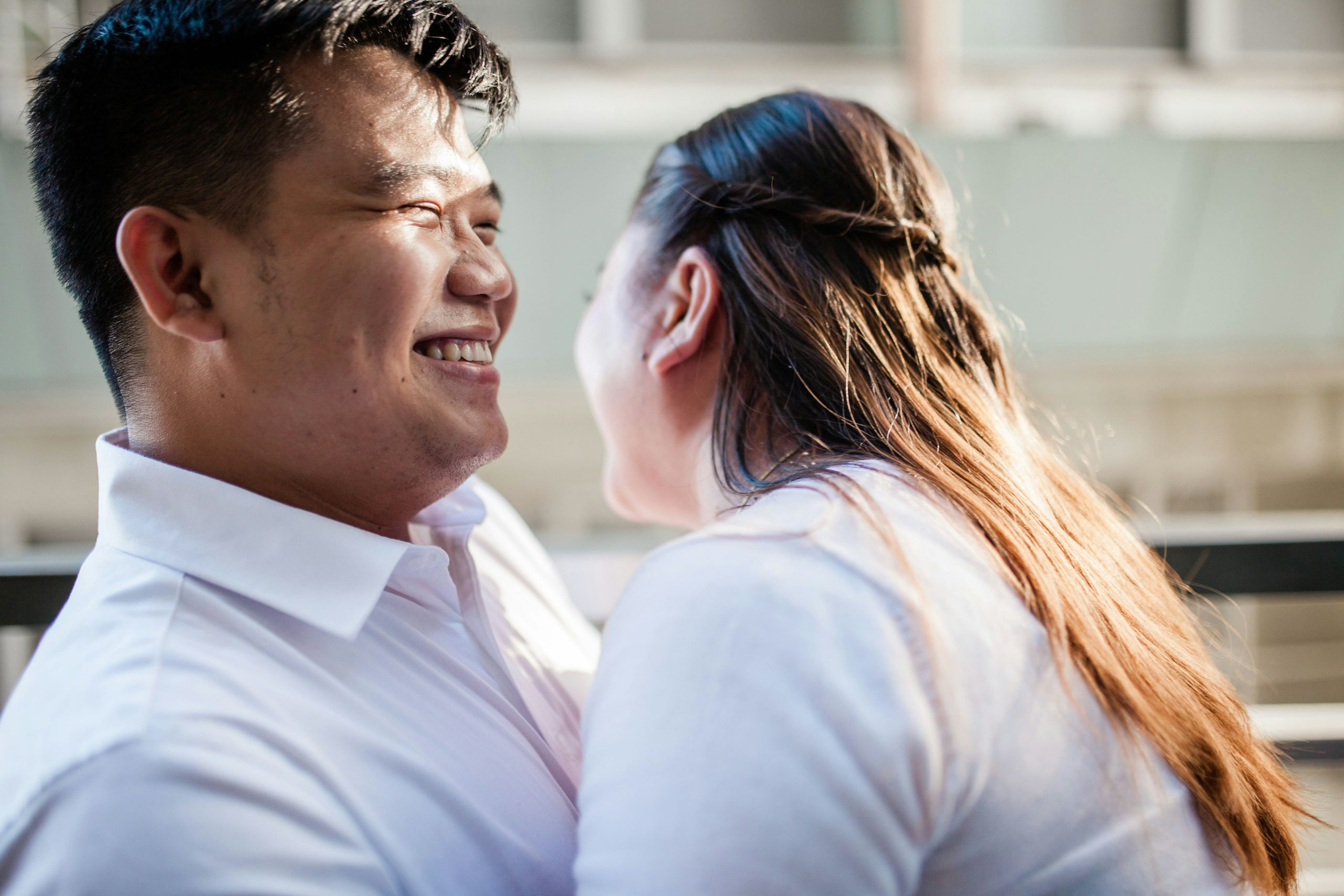Photo By Ralph Labay
Written By the H360 Editorial Team
OPENING NOTES FROM TRACIANA
Love—both self-love and romantic love—is a practice, not a prerequisite.
The advice to “love yourself first” assumes self-love is a destination rather than a journey. But what if learning to love yourself and learning to love another can happen simultaneously? What if the very act of loving and being loved teaches us about our own worth?
Through Fearless Listening, we discover that love—both self-love and romantic love—is a practice, not a prerequisite.
—Traciana
The Myth of Prerequisite Self-Love
The cultural narrative around relationships insists you must be complete before you can love someone else completely. “Love yourself first,” we’re told, as if self-love were a box to check before becoming worthy of partnership. This linear thinking creates an impossible standard: perfect self-acceptance before allowing yourself to be vulnerable with another person.
The reality is more complex and more hopeful. Learning to love yourself and learning to love another person are interconnected practices that can enhance rather than compete with each other. The question isn’t whether you’re “ready” for love, but whether you’re willing to love consciously—including loving yourself through the process of intimate connection.
Self-love isn’t a fixed state you achieve once and maintain forever. It’s an ongoing practice that deepens through experience, including the experience of being seen, accepted, and challenged by someone who cares about your growth. Many people discover aspects of themselves worth loving only through the mirror of intimate relationship.
The prerequisite model assumes that unresolved personal issues make you unfit for partnership. But everyone has unresolved issues—the difference lies in your awareness of them and your willingness to work with them consciously. A person with self-awareness about their patterns and a commitment to growth often makes a better partner than someone who believes they’ve completed their personal work.
The danger isn’t loving someone while you’re still learning to love yourself. The danger is using relationships to avoid the work of self-understanding or expecting your partner to provide the self-love you haven’t developed. When relationships become vehicles for external validation rather than expressions of genuine care, both partners suffer.
Understanding What You’re Seeking
Honest self-reflection about what you’re seeking in relationships becomes crucial. Are you looking for someone to complete missing parts of yourself, or are you seeking to share your life with someone while continuing to develop as an individual? The former creates codependency; the latter creates conscious partnership.
People who struggle with self-love often unconsciously seek partners who will provide constant reassurance, validation, or rescue. This places an impossible burden on relationships and prevents the development of internal resources for self-worth and emotional regulation. Recognizing this pattern allows you to address it directly rather than repeatedly creating relationships that can’t bear the weight of your unmet needs.
Alternatively, some people avoid relationships entirely when they sense they don’t fully love themselves, believing they must achieve perfect self-acceptance before allowing anyone close. This protection often prevents the very experiences that could teach them about their lovability and worth.
The Integration of Self-Love and Partnership
Healthy relationships can actually accelerate self-love when approached consciously. Being truly seen by someone who cares about your wellbeing can help you recognize aspects of yourself that deserve appreciation. Having your growth supported by a partner can strengthen your commitment to personal development. Learning to give love authentically often teaches you about your own capacity and worth.
This doesn’t mean depending on your partner for self-esteem, but rather allowing the experience of loving and being loved to inform your understanding of your own value. The key distinction lies in whether relationships supplement your self-love practice or substitute for it.
Partners who are also committed to personal growth can provide feedback, support, and perspective that enhances your self-awareness. They can help you recognize blind spots, celebrate your progress, and maintain accountability for your development. This mutual support for growth differs fundamentally from relationships where one person tries to fix the other or where personal development gets abandoned for the sake of relationship harmony.
Navigating the Learning Process Together
When both people in a relationship are learning to love themselves more fully, certain dynamics require conscious navigation. You might discover that your partner triggers insecurities you didn’t know you had, or that their growth challenges aspects of yourself you haven’t examined. These discoveries can strengthen relationships when approached with curiosity rather than defensiveness.
Communication becomes essential during periods of personal growth within relationships. Partners need to understand when you’re working through self-love challenges so they can provide appropriate support without taking responsibility for your emotional state. Learning to ask for what you need while also developing internal resources for self-care creates interdependence rather than codependence.
Conflict often reveals areas where self-love is underdeveloped. When disagreements trigger disproportionate emotional responses, when criticism feels devastating, or when your partner’s moods significantly affect your self-worth, these reactions provide information about where your self-love practice needs attention. Rather than avoiding these triggers, conscious couples use them as opportunities for deeper self-understanding and more authentic connection.
The Fearless Listening Approach to Love
Fearless Listening invites you to listen deeply to what’s happening within you during intimate relationships. What emotions arise when your partner is stressed, distant, or critical? What stories do you tell yourself about your worth based on their behavior? What aspects of yourself do you hide or emphasize to maintain their love?
This practice helps distinguish between your authentic feelings and the projections you place on your partner’s actions. When you can hear your own emotional responses clearly, you’re less likely to make your partner responsible for managing them. This creates space for genuine intimacy rather than emotional management.
The practice also involves listening to what your relationship patterns reveal about your relationship with yourself. Do you consistently attract partners who are emotionally unavailable, overly critical, or unable to commit? These patterns often reflect internal beliefs about your worthiness of love that haven’t been fully examined or healed.
Building Self-Love Through Conscious Relationship
Rather than waiting for perfect self-love before pursuing partnership, you can use conscious relationship as a laboratory for developing greater self-acceptance and awareness. This requires choosing partners who are also committed to growth and creating agreements about how you’ll support each other’s development.
Practice receiving love without immediately deflecting or questioning it. Notice when you dismiss compliments, avoid affection, or create distance when someone gets too close. These protective patterns often develop when self-love is fragile, but they prevent the very experiences that could strengthen your sense of worth.
Learn to communicate your needs and boundaries clearly. People who struggle with self-love often either become overly accommodating or create rigid walls around their emotions. Healthy relationships require the middle ground of knowing what you need and being able to express it kindly but directly.
Maintain your individual interests, friendships, and goals even when relationships feel consuming. Self-love includes honoring all aspects of yourself, not just the parts that relate to your romantic partnership. When relationships become total immersion experiences, both self-love and relationship quality suffer.
When Professional Support Enhances Love
Sometimes patterns around self-love and relationships require professional support to shift effectively. Therapy can help identify unconscious patterns, develop emotional regulation skills, and heal past experiences that interfere with current relationship capacity.
Individual therapy while in relationship can be particularly valuable, providing space to explore your patterns without involving your partner in every aspect of your growth process. This maintains appropriate boundaries while ensuring you have support for personal development.
Couples therapy or relationship coaching can help partners navigate growth periods together, developing communication skills and creating agreements that support both individual development and relationship health.
The Both/And of Love
Learning to love yourself and learning to love another person aren’t sequential processes—they’re parallel practices that can enhance each other when approached consciously. The goal isn’t achieving perfect self-love before allowing yourself to be loved, but rather developing the awareness and skills to love consciously in both directions.
Through Fearless Listening, you can hear what your relationship experiences teach you about your own worth, needs, and capacity for connection. Love becomes both a mirror for self-discovery and a practice for expressing your authentic self in relationship with another person.
About the Happiness 360 Editorial Team:
The H360 Editorial Team features global writers and experts across disciplines, creating content that expands thinking across the five intelligences of Fearless Listening®: emotional, spiritual, physical, generational, and strategic—in order to support deeper self-awareness, self-actualization, and more aligned decision-making. [Learn more]
Disclaimer: This content is for informational purposes only and is not intended as medical or fitness advice. Consult qualified exercise professionals and healthcare providers before starting any new exercise program, especially if you have health conditions or injuries. Read our full disclaimer →






















0 Comments for “Finding or Keeping Love When You’re Still Learning to Love Yourself”